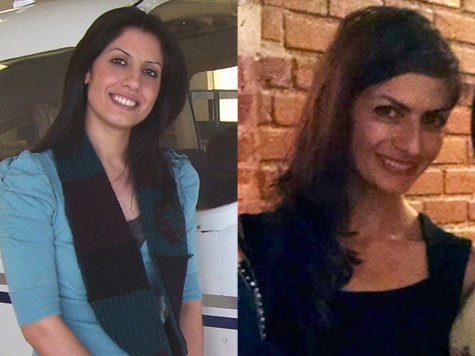
Two young Yezidi women are heroically negotiating for the survival of their people in Iraq. They are talking to the media, planning to lobby Congress, and tell me that they have interested at least three countries in providing political asylum for the Yezidis–if they can be rescued militarily.
Adoul Keijan and Gulie Khalaf are Yezidi-American cousins. They view themselves as advocates for their people and as front-line soldiers because they can speak English and are safely away from a horrifying war-zone.
As we know, ISIS has conducted a barbaric and brutal march across Iraq. On August 3rd, ISIS began slaughtering all those Yezidis who refused to convert to Islam. They also kidnapped many Yezidi women and kept them or sold them as sex slaves.
For five days in August of this year, 40,000 Yezidis were stranded atop Mount Sinjar without food or water. On August 8th, American forces dropped humanitarian supplies and created a safe passage down the mountain for many thousands of Yezidis.
Adoul Keijan’s aunt was among them.
However, Adoul tells me, “a week after being rescued, my aunt called crying and begging for help. She had one gun to protect them from ISIS, but had to sell it in order to get food and water.”
In recent weeks, Adoul has not been able to contact anyone in her extended family.
On October 20th, ISIS renewed their assault on the Yezidis, forcing the remaining Yezidis up Mt. Sinjar.
And there they remain–again without food or water and without a second American air-strike in view. I do not understand what President Obama is waiting for.
Adoul Keijan escaped from Iraq when she was nine, together with her parents. She grew up in refugee camps in Syria where Yezidis were routinely persecuted. Her cousin Gulie Khalaf, who lived in the same camp with Adoul, writes, “We were treated as second class citizens both in school and at the camp. Every year the Christians and the Muslims would get free gifts from the government during their major holidays, such as Christmas and Eid. None of our holidays were recognized. In school if we didn’t read Qu’ran we would get lower grades and in middle school if we didn’t participate in Qu’ran class we would fail.” In the refugee camps, she says, “it was a rough life. There was no running water… Sometimes fights would break out because water was scarce.” Their luck with food was no better: “We would get our bread from the local baker, and many times the bread had bugs in it.”
With her parents, Adoul was granted political asylum in America in 1999 when she was sixteen years old. Luckily, Gulie’s family was also brought to America at the same time.
Since then, Adoul became an American success story. She is now an EMT paramedic and a pilot who owns a company–North American Aerials–which is devoted to humanitarian rescues. People pay to take aerial tours and Adoul and her partner, Daniel Kairys, donate the funds to charity. Adoul says, “We started a Humanitarian Relief Effort campaign on September 1st which goes on until Thanksgiving. Anyone who buys an aerial photography shoot or an airplane ride from us has the option of having all the proceeds go toward this cause.”
Now, three weeks later, about 5,000 women, children, and the elderly remain on Mt. Sinjar, stranded. As of October 20th, more Yezidis are being forced back up the mountain.
According to the United Nations, over 200,000 Yezidis were displaced within 48-hours in August. Many others have been kidnapped, or murdered.
The Yezidi people have roots in common with Hinduism and Zoroastrianism; they believe in reincarnation. The Yezidis may have migrated from India 5,000 years ago. Their native language is Kermanji Kurdish, but Adoul also speaks Badini Kurdish, Arabic, and English. I was brought together with these two women by a Hindu friend and colleague who has been working on their behalf.
Adoul tells me: “Gulie and I have stayed in touch ever since and we both are working very closely together to raise funds and awareness about the situation our people are facing in Northern Iraq.”
Together, they have interested Sri Sri Ravi Shankar, an Indian Guru, in helping them by negotiating political asylum in India for those Yezidis who can be rescued. But, they have not stopped there. Adoul tells me that negotiations are now also under way with Kurds and Israelis for additional sites of political asylum–until a better time.

They are quintessential Americans–grateful to America for having given them political asylum and yet still loyal to their people who are living in a bloody Inferno of hate.
For more information, please visit their website, Yezidis.org, where they post news and organize events to help the humanitarian effort.
Photos courtesy Phyllis Chesler.

COMMENTS
Please let us know if you're having issues with commenting.